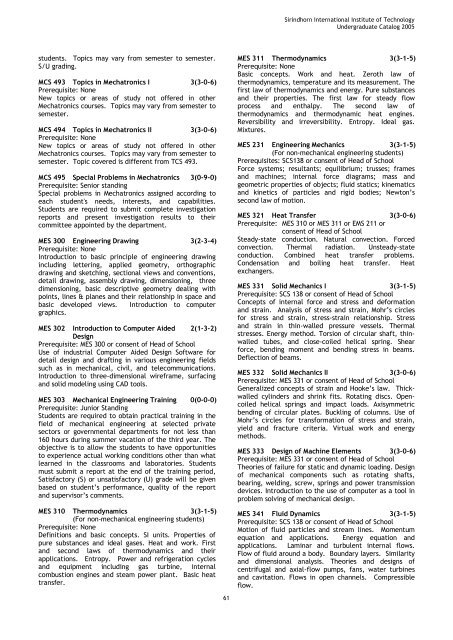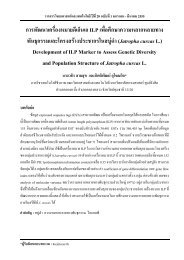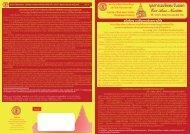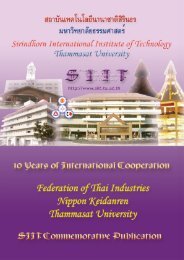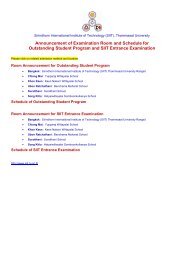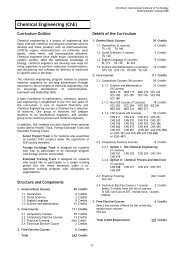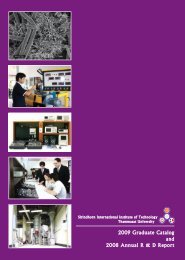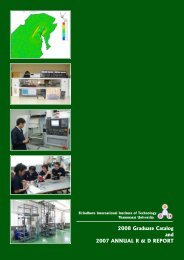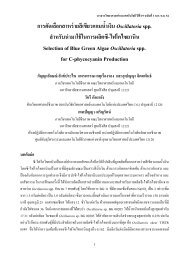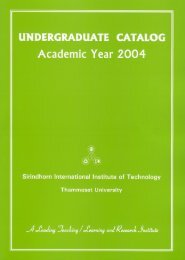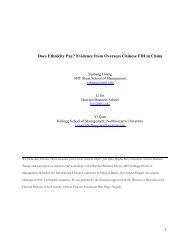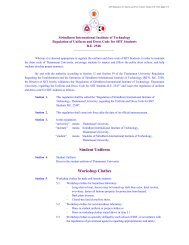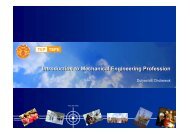Course Description - Sirindhorn International Institute of Technology
Course Description - Sirindhorn International Institute of Technology
Course Description - Sirindhorn International Institute of Technology
You also want an ePaper? Increase the reach of your titles
YUMPU automatically turns print PDFs into web optimized ePapers that Google loves.
<strong>Sirindhorn</strong> <strong>International</strong> <strong>Institute</strong> <strong>of</strong> <strong>Technology</strong><br />
Undergraduate Catalog 2005<br />
students. Topics may vary from semester to semester.<br />
S/U grading.<br />
MCS 493 Topics in Mechatronics I 3(3‐0‐6)<br />
Prerequisite: None<br />
New topics or areas <strong>of</strong> study not <strong>of</strong>fered in other<br />
Mechatronics courses. Topics may vary from semester to<br />
semester.<br />
MCS 494 Topics in Mechatronics II 3(3‐0‐6)<br />
Prerequisite: None<br />
New topics or areas <strong>of</strong> study not <strong>of</strong>fered in other<br />
Mechatronics courses. Topics may vary from semester to<br />
semester. Topic covered is different from TCS 493.<br />
MCS 495 Special Problems in Mechatronics 3(0‐9‐0)<br />
Prerequisite: Senior standing<br />
Special problems in Mechatronics assigned according to<br />
each student's needs, interests, and capabilities.<br />
Students are required to submit complete investigation<br />
reports and present investigation results to their<br />
committee appointed by the department.<br />
MES 300 Engineering Drawing 3(2‐3‐4)<br />
Prerequisite: None<br />
Introduction to basic principle <strong>of</strong> engineering drawing<br />
including lettering, applied geometry, orthographic<br />
drawing and sketching, sectional views and conventions,<br />
detail drawing, assembly drawing, dimensioning, three<br />
dimensioning, basic descriptive geometry dealing with<br />
points, lines & planes and their relationship in space and<br />
basic developed views. Introduction to computer<br />
graphics.<br />
MES 302 Introduction to Computer Aided 2(1‐3‐2)<br />
Design<br />
Prerequisite: MES 300 or consent <strong>of</strong> Head <strong>of</strong> School<br />
Use <strong>of</strong> industrial Computer Aided Design S<strong>of</strong>tware for<br />
detail design and drafting in various engineering fields<br />
such as in mechanical, civil, and telecommunications.<br />
Introduction to three‐dimensional wireframe, surfacing<br />
and solid modeling using CAD tools.<br />
MES 303 Mechanical Engineering Training 0(0‐0‐0)<br />
Prerequisite: Junior Standing<br />
Students are required to obtain practical training in the<br />
field <strong>of</strong> mechanical engineering at selected private<br />
sectors or governmental departments for not less than<br />
160 hours during summer vacation <strong>of</strong> the third year. The<br />
objective is to allow the students to have opportunities<br />
to experience actual working conditions other than what<br />
learned in the classrooms and laboratories. Students<br />
must submit a report at the end <strong>of</strong> the training period,<br />
Satisfactory (S) or unsatisfactory (U) grade will be given<br />
based on student’s performance, quality <strong>of</strong> the report<br />
and supervisor’s comments.<br />
MES 310 Thermodynamics 3(3‐1‐5)<br />
(For non‐mechanical engineering students)<br />
Prerequisite: None<br />
Definitions and basic concepts. SI units. Properties <strong>of</strong><br />
pure substances and ideal gases. Heat and work. First<br />
and second laws <strong>of</strong> thermodynamics and their<br />
applications. Entropy. Power and refrigeration cycles<br />
and equipment including gas turbine, internal<br />
combustion engines and steam power plant. Basic heat<br />
transfer.<br />
MES 311 Thermodynamics 3(3‐1‐5)<br />
Prerequisite: None<br />
Basic concepts. Work and heat. Zeroth law <strong>of</strong><br />
thermodynamics, temperature and its measurement. The<br />
first law <strong>of</strong> thermodynamics and energy. Pure substances<br />
and their properties. The first law for steady flow<br />
process and enthalpy. The second law <strong>of</strong><br />
thermodynamics and thermodynamic heat engines.<br />
Reversibility and irreversibility. Entropy. Ideal gas.<br />
Mixtures.<br />
MES 231 Engineering Mechanics 3(3‐1‐5)<br />
(For non‐mechanical engineering students)<br />
Prerequisites: SCS138 or consent <strong>of</strong> Head <strong>of</strong> School<br />
Force systems; resultants; equilibrium; trusses; frames<br />
and machines; internal force diagrams; mass and<br />
geometric properties <strong>of</strong> objects; fluid statics; kinematics<br />
and kinetics <strong>of</strong> particles and rigid bodies; Newton’s<br />
second law <strong>of</strong> motion.<br />
MES 321 Heat Transfer 3(3–0–6)<br />
Prerequisite: MES 310 or MES 311 or EMS 211 or<br />
consent <strong>of</strong> Head <strong>of</strong> School<br />
Steady‐state conduction. Natural convection. Forced<br />
convection. Thermal radiation. Unsteady‐state<br />
conduction. Combined heat transfer problems.<br />
Condensation and boiling heat transfer. Heat<br />
exchangers.<br />
MES 331 Solid Mechanics I 3(3‐1‐5)<br />
Prerequisite: SCS 138 or consent <strong>of</strong> Head <strong>of</strong> School<br />
Concepts <strong>of</strong> internal force and stress and deformation<br />
and strain. Analysis <strong>of</strong> stress and strain, Mohr’s circles<br />
for stress and strain, stress‐strain relationship. Stress<br />
and strain in thin‐walled pressure vessels. Thermal<br />
stresses. Energy method. Torsion <strong>of</strong> circular shaft, thinwalled<br />
tubes, and close‐coiled helical spring. Shear<br />
force, bending moment and bending stress in beams.<br />
Deflection <strong>of</strong> beams.<br />
MES 332 Solid Mechanics II 3(3–0–6)<br />
Prerequisite: MES 331 or consent <strong>of</strong> Head <strong>of</strong> School<br />
Generalized concepts <strong>of</strong> strain and Hooke’s law. Thickwalled<br />
cylinders and shrink fits. Rotating discs. Opencoiled<br />
helical springs and impact loads. Axisymmetric<br />
bending <strong>of</strong> circular plates. Buckling <strong>of</strong> columns. Use <strong>of</strong><br />
Mohr’s circles for transformation <strong>of</strong> stress and strain,<br />
yield and fracture criteria. Virtual work and energy<br />
methods.<br />
MES 333 Design <strong>of</strong> Machine Elements 3(3–0–6)<br />
Prerequisite: MES 331 or consent <strong>of</strong> Head <strong>of</strong> School<br />
Theories <strong>of</strong> failure for static and dynamic loading. Design<br />
<strong>of</strong> mechanical components such as rotating shafts,<br />
bearing, welding, screw, springs and power transmission<br />
devices. Introduction to the use <strong>of</strong> computer as a tool in<br />
problem solving <strong>of</strong> mechanical design.<br />
MES 341 Fluid Dynamics 3(3‐1‐5)<br />
Prerequisite: SCS 138 or consent <strong>of</strong> Head <strong>of</strong> School<br />
Motion <strong>of</strong> fluid particles and stream lines. Momentum<br />
equation and applications. Energy equation and<br />
applications. Laminar and turbulent internal flows.<br />
Flow <strong>of</strong> fluid around a body. Boundary layers. Similarity<br />
and dimensional analysis. Theories and designs <strong>of</strong><br />
centrifugal and axial‐flow pumps, fans, water turbines<br />
and cavitation. Flows in open channels. Compressible<br />
flow.<br />
61


